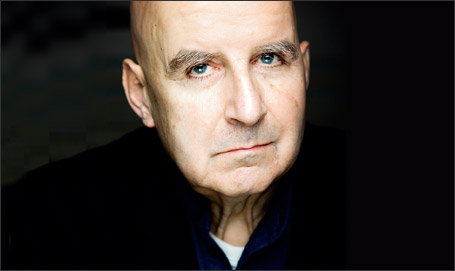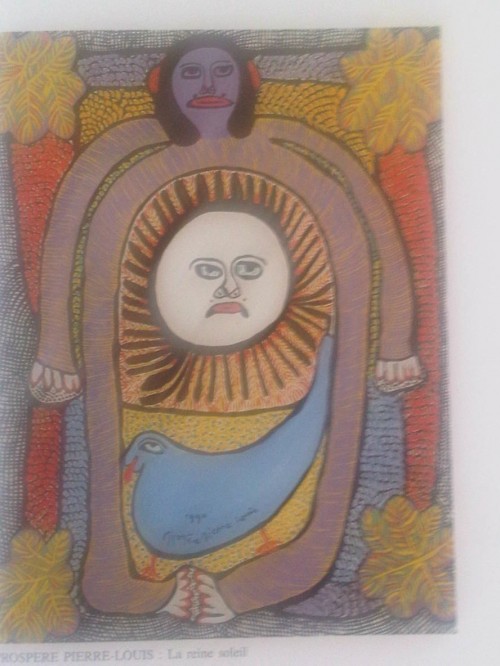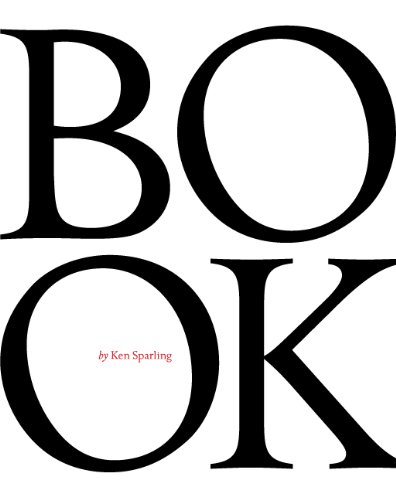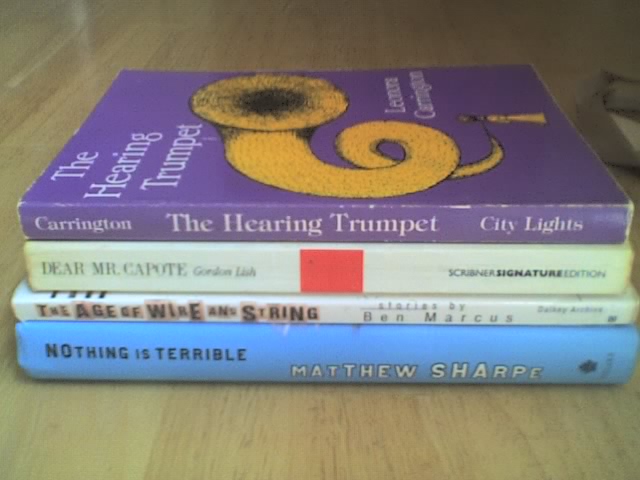Paragraphs of Paragraphs (8): Pierre Guyotat

Death to the officers! O my latrine, hug me stronger. I give you my wife. Throw my babies into the fire, to the dunghill, trample them under the foot of the marriage bed heavy with your intermingled bodies. She caresses, she kisses your worried muscles. Tear with your teeth rotten by the black meat and the bromided wine, tear with your tanned cock the linen hanging in the toilets, the linen fragrant with the talc and the vomit of the new-born. Ransack my furniture. The room exhales, you erect naked and wearing wool up to the knees, a fragrance of snow and grease. Strangle, knock senseless in their bed my father and my mother. Slaughter on his exercise books my brother dozing at the table. The bites of the native whores reopen on the lower part of your belly under the hair. Dig with your dagger, ear cutter, the polished flooring and free the spring singing for my child in the foundations. Lie down in its water and the cuttings and the earth and the cement powder covering your jaw, fuck my wife to death and, standing up again, squash her head in the stream blocked by sperm. And feeling light, rifle hanging from the shoulder and the mosquito net tied around your loins, push the door and, once you reached the border, throw yourself into our arms laden with dying game. O ear cutter, hoist yourself up with us in the hollow between the branches warmed up by our turds. The smell of the married men’s blood is shrouding the city. To it we prefer the fragrance of the bugs gorged with our blood.
“Every word was once an animal. – Emerson” – Marcus
Today, at Community Thrift on 17th and Valencia, I bought these books for $2.50. The first page of Dear Mr. Capote says “Ed Seifert” in pencil. Wonder if he’s related to George, who won the Super Bowl. Jaroslav won the Nobel Prize. My family farmed the rim of the Dust Bowl and nearly made it stinking rich off a bunch of black sand but didn’t. It seems “Seifert” comes from “cipher.” Encoding words is a form of mathematics. “Mathematics is the supreme nostalgia of our time.” – Michael Marcus
Tomorrow I’m reading at Amnesia, at nine o’clock, with Lindsay Hunter, Amelia Gray, and Aaron Burch. Wearing a coonskin cap and a corduroy suit, I will read from my novel for the very first time. The novel is called A Dog On Onondaga. I vow to never finish writing it, but to self-publish new handbound editions whenever I feel like it. Maybe you think that’s vain. Sometimes I stare in the mirror for oceans of time, for no reason. Your opinion of me is so much sand on the beach of yesterday. Three days ago part of me did something immoral; the rest of me has only begun to feel bad. Another part of me wants desperately to be lost in the desert with a backpack full of books; but that can probably wait until the winter of my content. I plan to go to the community pool tomorrow, so that my body will remember what it was like when it was a word. READ MORE >
“it had this varnish all over it / we got this varnish all over us”
 Deeply excited to spread of word of Emily Toder’s Brushes With, which is a little book about meeting shapes that’s coming out from Tarpaulin Sky. Stop shaving your home bases and practicing the same three chords and have a look at this. Excerpt after the jump:
Deeply excited to spread of word of Emily Toder’s Brushes With, which is a little book about meeting shapes that’s coming out from Tarpaulin Sky. Stop shaving your home bases and practicing the same three chords and have a look at this. Excerpt after the jump:
THE FROWNING SUN by Ariana Reines
 [Regular readers might recall that back in March, Ariana Reines was trying to raise some money to send herself to Haiti as a translator for a group of trauma clinicians. We helped her, and then checked back in a month later. Today we’ve got something very special- over the approximately five pages that follow, Ariana offers an original piece of nonfiction, two paragraphs of journalism, a reading list, an explanation of WHAT [SHE] DID, an appendix, and some links. You can download THE FROWNING SUN as a .pdf, or click through and read it all here on the site. – JT ]
[Regular readers might recall that back in March, Ariana Reines was trying to raise some money to send herself to Haiti as a translator for a group of trauma clinicians. We helped her, and then checked back in a month later. Today we’ve got something very special- over the approximately five pages that follow, Ariana offers an original piece of nonfiction, two paragraphs of journalism, a reading list, an explanation of WHAT [SHE] DID, an appendix, and some links. You can download THE FROWNING SUN as a .pdf, or click through and read it all here on the site. – JT ]
.
THE FROWNING SUN
One day two years ago I was drunk and angrily fucked my boyfriend while the movie Divine Horsemen: The Living Gods of Haiti played on ubuweb with the volume turned up loud. Eight months ago, that boyfriend found my subsequent boyfriend in bed with me and beat him severely in the head, screaming “You fucking rapist”. Now the former is married and the latter is far away.
While I was in Haiti, about five weeks ago, the man I referred to above as “my boyfriend,” “that boyfriend,” and “the former” got shot in the stomach by a neighbor in what the internet reported as a “dispute over a dog.” I hope he is alright and can continue to eat spicy foods, which he enjoys, and that his career of violence, like mine, is at an end.
So Watson Going To Happen When They Startson Writing The Great American Novel?
Turns out, making time to read the Times was totally worth it, although this article is free online.
Basically, computer scientists have programed a supercomputer named Watson (not yr dad’s supercomputer, a new one – so you can chew on what that means) to interpret English syntax well enough to answer Jeopardy! questions using a shitload of data uploaded from books, magazines, and newspapers (all the stuff we don’t have time to read ((yet))).
While it’s far from perfect, there’s definitely some potential here for the same sort of freakish synapse connections we make when we play with language and such and !
Drunk On That Vintage Kick
httpv://www.youtube.com/watch?v=nCKtEvjoGOs
Some things are inept in their own time. And like a fine wine, they have to age.
Ken Sparling’s Book

In Book, Ken Sparkling’s newest book, which I believe partway through now not only to be his best, but many’s best, on page 21, the would-be becoming age, the page begins like this:
“A space opens among words. Move the words apart. Wire the sentences to the page. Lean over the spaces you’ve made. Do you think they will all be the same? It must be part of the problem that they won’t go away. Make the sentences cold and unknowable. Every single sentence you’ve written, let this happen. They won’t fight back. Sentences don’t fight back. They get empty. Fake. They get hard. At some point the words will change. Twist. The words seem to open very wide. When the sentences seem to point and grin at you, indifferent, grab the paper. Watch the words appear beneath your hands. Run your hands over the paper.”
I am now age 31. Page 31 of Book ends:
“He thought if he waited long enough, the little campers would calm down and stop talking amongst themselves. He thought he could just keep waiting and that eventually one of them would tell him what this was all about. The ogre had an eye where his belly button should have been. Even more disgusting, he had two belly buttons where his eyes should have been.”
I hope to live to the age of 226, the last page of this book. It’s the only way to take it all in, no matter how magical, how funny, how every graph maxed. $$$. I’m reading.
This is a map made by an exiled pianist, as a directive to the members of his band. He could not foresee that his musical and topographical instruction should be used backwards. As a cartographer, he was not appreciated in his own country.
While trying and failing to embed Peter Greenaway’s hilarious film, A Walk Through H (1978), which is what I actually want you to watch here (so pardon this aside – it’s what I do), I found this 3D walk-through of the Beis Hamikdash in Jerusalem. This is the temple where, in the New Testament, Jesus is said to have prayed and chased merchants away, claiming they were desecrating the temple. The temple in this video. READ MORE >
Reading (&) the Body
I’m re-reading a little Peter Brooks in column A and in column B thinking a lot about reading and the body, reading as consumption, reading while eating, reading while shitting, reading while smoking, the frenetic idleness of reading finding its counterpoint in various bodily acts/needs/processes.
From Brooks’s Reading for the Plot:
Speaking reductively, without nuance, one might say that on the one hand narrative tends toward a thematics of the desired, potentially possessable body, and on the other toward a readerly experience of consuming, a having that, in an era of triumphant capitalism, is bound to take on commercial forms, giving to the commerce in narrative understandings a specifically commercial tinge.
What do you do when you read? Or do you just read?





